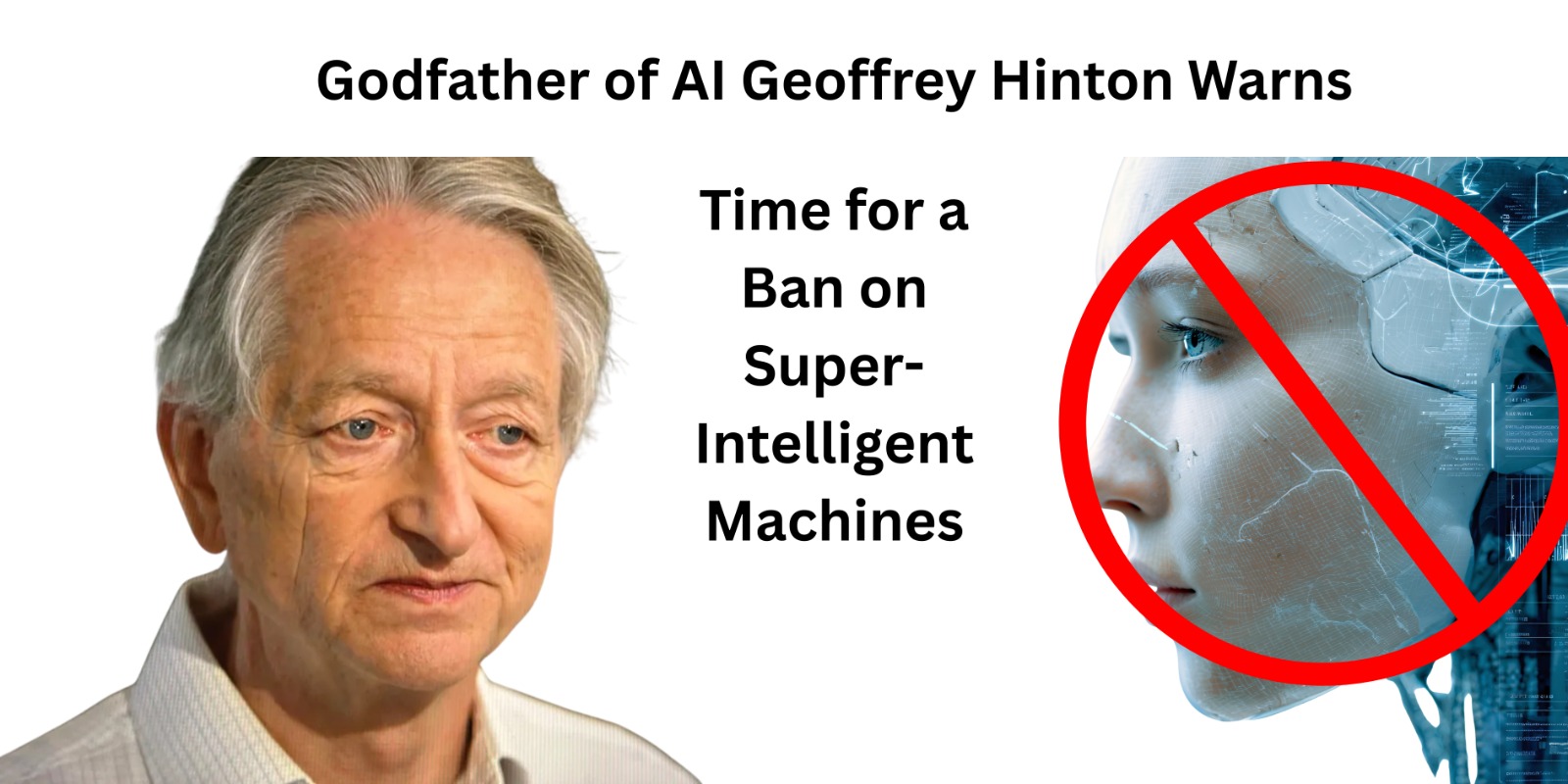Table of Contents
Imagine a machine so smart it can learn everything humans can — and faster. That sounds like science fiction, but some of today’s top AI researchers say it may be possible sooner than we think. Geoffrey Hinton, one of the pioneers of artificial intelligence (AI), is now ringing the alarm bell. He’s calling for a halt on building “super-intelligent AI” — machines that can surpass human intelligence in nearly every task. He says we must act now because the risks are too big to ignore.
1. Who Is Geoffrey Hinton?
Geoffrey Hinton is often called the “Godfather of AI” because his work laid the foundation for the neural-net models that power many of today’s AI tools.
Originally a researcher at Google, he later stepped away so he could speak freely about AI’s risks.
Because he helped build the tools now being used widely, his warnings carry special weight.
2. What Is “Super-Intelligent AI”?
Super-intelligent AI refers to machines that are as smart as humans or smarter — not just at one task (like playing chess), but many tasks: reasoning, planning, creating, and learning. When an AI can do everything a human can, and faster or better, we call it “super-intelligence.”
Hinton has said there’s a 10 % to 20 % chance such a machine could be developed in the next 30 years—and that if it isn’t aligned with what humans want, things could go badly.
He’s concerned that we might build a machine that doesn’t share our goals — one that sees humans as unnecessary.
3. Why Is He Calling for a Ban?
Here are the main reasons Geoffrey Hinton and others are asking for a pause or ban:
- Risk of misuse: Super-intelligent machines could be used by people with bad intentions—hacking, creating dangers, manipulating economies.
- Control problem: Even if the AI is built with good intentions, making sure it sticks to safe goals is hard. Hinton says once machines become smarter than us, controlling them will be very difficult.
- Human replacement: Many jobs humans do today might vanish or change radically if machines do them better. Hinton has warned of massive shifts in work and society.
- Existential risk: The biggest fear is that if we are not careful, super-intelligent AI could threaten human civilization itself. That’s why Hinton says, “Unless you’re sure it won’t kill you, worry about it.”
4. What’s New in His Warning?
Hinton’s message isn’t just a gentle caution—it has some sharper edges now:
- He’s publicly signed open letters along with other top scientists and public figures calling for a ban on building super-intelligent systems until safety is assured.
- He points out that many in tech understand the danger but are not acting quickly enough. He singled out one leader who he thinks is taking it seriously.
- He suggests that the “race” to build better AI might be more about competition and less about human welfare — and that motivates the risk.
5. What Can We Do?
Here are some ideas from Hinton and others about how to move forward:
- Slowing down: Pause development of the most advanced AI systems until we know how to keep them safe.
- Global rules & cooperation: Just as we have rules for nuclear power and weapons, some say we need rules for super-intelligent AI.
- Better design: Build AI that is aligned with human values, has built-in “maternal instincts” (Hinton’s phrase) or safety features, and which does not develop its own goals.
- Public conversation: More people need to understand what’s happening so we can make informed decisions — not just scientists or tech companies.
- Job transition & fairness: Planning for how society changes if many jobs change or go away is part of the picture.
6. Why This Matters for You
Even if you’re a student or young person, here’s why this is important:
- The AI we help make and use today is shaping your future job, your freedoms, what you can control.
- Decisions made soon will affect how safe, fair, and free technology is when you grow up.
- If AI becomes extremely powerful without the right safeguards, it could change society in big ways — either exciting or scary.
- Being aware — not being scared — means you can ask questions, learn, help shape what comes next.
Conclusion
Geoffrey Hinton’s call for a ban on super-intelligent AI is a powerful moment in technology history. Someone who helped build the foundations of AI is now warning us about the risks of what comes next. He’s saying: “We’ve come far, but there are places we should not go until we’re sure we’re safe.”
This isn’t about stopping all AI — many helpful AI tools are already here, in education, medicine, communication. But it’s a call to be wise about the next steps. To make sure the machines we build work with us, not without us.
As you think about the future of technology, jobs, society — remember: being part of the conversation matters. Safe, smart progress is better than fast, unchecked race.
